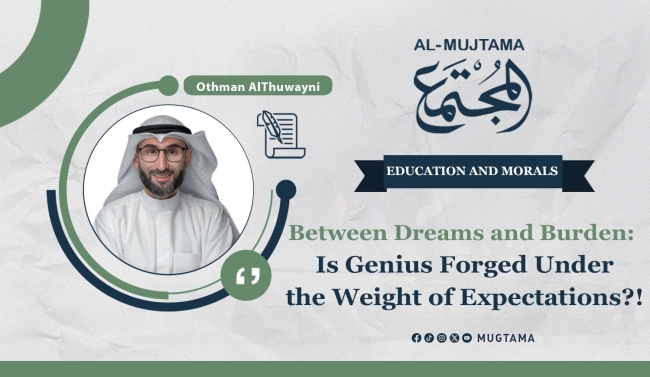Between Dreams and Burden: Is Genius Forged Under the Weight of Expectations?!
On a winter evening, a father sat sipping his coffee after a long day, watching his young son immersed in his homework. He said firmly, with hope in his tone, "I want you to be like Einstein, great in your knowledge, distinguished among your peers. There's no room here for mediocrity or ordinariness."
In the father's eyes burned a flame of wide-reaching dreams to see his son at the forefront, excelling, standing out, and carrying the family's legacy and ideas. But do parents realize that these expectations can sometimes become burdens that rob children of their childhood?
High parental expectations often start with noble intentions, as every father and mother aspire to see their children at their best. However, when these expectations cross the line into excess, they become chains that bind children's spirits and hinder their natural growth. Children are not blank pages upon which we write our dreams; they are seeds containing diverse potentials. What blooms in the fertile soil of care and support can wither if burdened by pressure.
In our societies, children are often seen as a natural extension of family aspirations, bearing its banner and representing its values. But this perspective sometimes places them in challenging situations, where they are expected to display maturity beyond their years and achieve successes that sometimes exceed their innate abilities.
Expecting a child to act like an adult or speak with the wisdom of elders may be tempting, but it overlooks the fact that childhood and adolescence are not merely transient stages; they are formative periods essential for character development.
Psychological theories tell us that childhood is the foundation upon which everything is built. According to psychologist Erik Erikson, children, during their developmental stages, seek to discover their identity and develop independence. When parents impose a particular identity or level of achievement, it creates an internal conflict that may lead to an identity crisis. High expectations can also affect a child's self-esteem. If the standards set exceed their natural abilities, their sense of self-worth gradually erodes. Moreover, these expectations may hinder a child from experiencing the freedom to explore the world and develop their skills flexibly. Childhood is not a race to the top but a journey of discovery where wings grow gradually.
Islamic traditions also emphasize the importance of gradual development in upbringing and respecting different growth stages. When the Prophet Muhammad ﷺ said: "Command your children to observe prayer when they are seven years old, and beat them for [not observing] it when they are ten years old" (Sunan Abu Dawood, Book 2, Hadith 495), he underscored the importance of gradually entrusting children with responsibilities in line with their age. This prophetic wisdom reflects a deep understanding of a child's psychological growth and the need for a balance between firmness and care.
Historical examples also show how early Muslims treated children with gentleness and care without overburdening them with excessive expectations. Caliph Umar ibn Abdul Aziz, for example, was known for his wisdom in parenting, recognizing that children are not tools to prove parental success but a trust to be nurtured with love and understanding.
Some may cite historical figures to justify raising expectations, such as geniuses like Leonardo da Vinci and Isaac Newton, who excelled at a young age. Similarly, in Islamic history, figures like Imam Al-Shafi'i memorized the Quran as a child and excelled in jurisprudence early on. However, what many overlook is that these individuals grew up in supportive environments that respected their innate abilities without imposing obligations that exceeded their natural limits.
The brilliance displayed by some children is not merely the result of high parental expectations or familial environments but a product of a complex interplay of factors shaping the child’s personality and influencing their developmental trajectory. While high expectations can be one of these factors, it is neither the sole nor the most important one. Other forces play a role in fostering brilliance, some internal and stemming from the child's own nature, and others external, related to their environment and opportunities.
Innate abilities and genetic factors play a pivotal role in determining a child's potential. Genetics influence brain structure and learning speed, giving some children a natural advantage, even in the absence of strong external support. Moreover, some children possess intrinsic motivation driven by their passion for a particular field or love of learning and discovery. These children excel not because of familial expectations but due to an internal force pushing them to stand out.
Experiences and exposures, whether through educational activities or interactions with inspiring individuals, add another dimension to their growth. The educational role of teachers and society also significantly impacts discovering and developing a child's talents. Additionally, societal culture profoundly affects the opportunities available to a child, as talents flourish in environments that encourage creativity and embrace individual differences.
Sometimes, luck and randomness also contribute to brilliance. A child might encounter someone who changes their life's course or stumble upon a book that opens new horizons. These fleeting moments can have a more profound impact than years of directed upbringing.
In the end, expectations are not the only factor determining a child's fate. Brilliance is not forged through pressure alone but requires a balanced environment that respects individuality and supports natural growth. Children are not projects for fulfilling dreams but unique souls needing understanding, appreciation, and care. Only when treated with this wisdom can they reveal their true potential and pursue their own identities—not ours.
-------------------------------------------------------------


